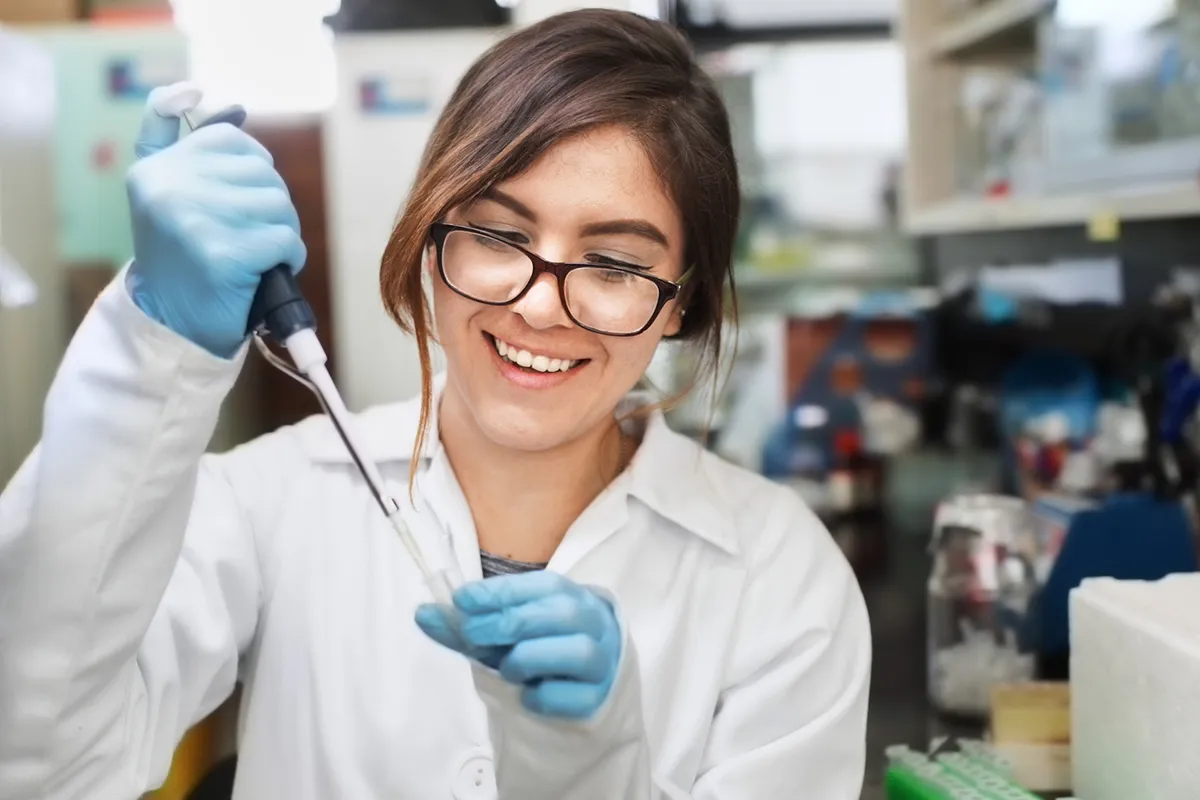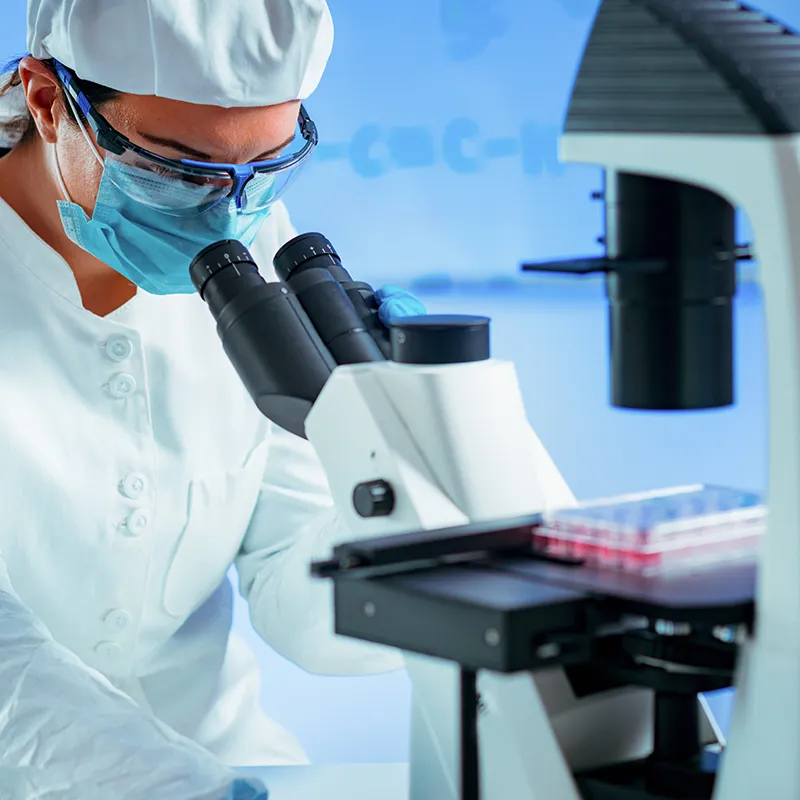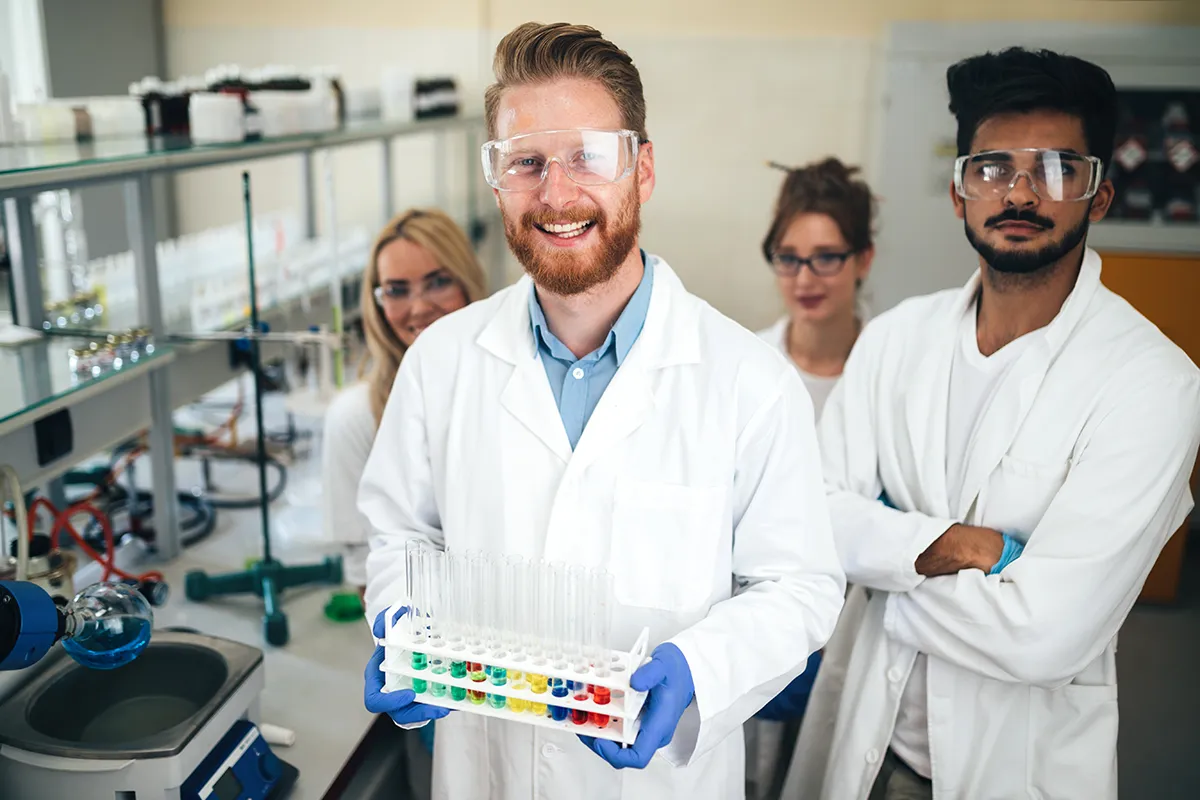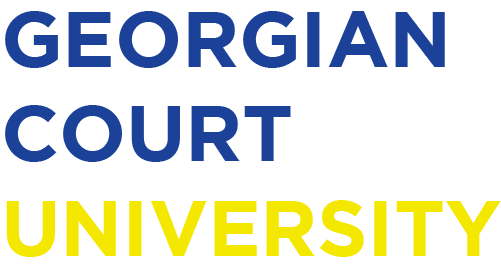Biology
Bachelor of
Science in
Biology


Biology is the study of life—a science that focuses on living organisms and their origin, evolution, growth, reproduction, structure, and behavior.
There are many different fields of biology, including anatomy, marine biology, physiology, ecology, immunology, evolution, health and medicine, zoology, microbiology, genetics, molecular biology, and botany.
Since the fields within biology are wide ranging and diverse, so are biology jobs. And since 14 of the largest 20 pharmaceutical companies in the world and over 350 biotech companies call New Jersey home, our students often find internships, networking opportunities, and career opportunities close to home.
Georgian Court offers both a B.A. in Biology for students who want to teach at the pre-college level and a B.S. in Biology for other career paths. If you wish to teach at the pre-college level, biology will be your first major and education will be your second major after fulfilling School of Education requirements for teacher certification.

Ph.D., Cellular and Developmental Biology and Genetics
Why Study Biology at GCU?
- Student-faculty research is highly encouraged in our biology programs and includes the opportunity to interact one-on-one with faculty in a team setting.
- Hands-on experience with laboratory instruments and techniques that translate into marketable career skills.
- Robust internship opportunities within a variety of settings including the biomedical, environmental, and pharmaceutical industries.
- GCU offers a specialized medical laboratory science track with Jersey Shore University Medical Center for students pursuing either a B.A. or B.S. in Biology. Please see details in the B.A. and B.S. in Biology program information.
- Individualized academic advising helps biology students select appropriate courses and find extracurricular activities that support their career goals.
- Pre-medical, pre-dental, pre-veterinary, and other pre-health students benefit from pre-health advising and GCU's partnerships with a range of professional health programs.

What Students Might Be Interested in Biology?
Students with a passion for helping people, animals, and the planet who enjoy research, technology, nature, discovery, and solving complex problems are a great fit for a biology degree. Most scientists are creative, disciplined, analytical, and naturally curious.

What Can I do with a Biology Degree?
A bachelor’s degree in biology can lead directly to careers in biomedical research, pharmaceutical development and testing, sales, education (requires coursework for teacher certification), journalism, and more. Some students pursue a biology major to prepare for medical, veterinarian, dental, and other healthcare schools while others choose master’s or doctoral programs to specialize in a specific area of biology or a related fields like biomedical engineering or genetic counseling. A sampling of careers and median annual salaries from the U.S. Bureau of Labor Statistics are shown below. Note: Biology jobs that require a double major, minor, or an advanced degree and additional certifications and licensures are marked with an asterisk:
- Clinical lab technician - $57,800
- High school teacher* - $61,820
- Environmental scientist - $76,530
- Microbiologist* - $79,260
- Genetic counselor* - $80,150
- Medical research scientist* - $95,310
- Veterinarian* - $100,370
- Physician Assistant* - $121,530
- Pharmacist* - $128,570
- Physician* - $208,000
B.A. and B.S. in Biology Program Information
You’ll need to successfully complete at least 120 credits, including General Education requirements and 40 credits in biology (for the B.S.) and 30 credits in biology (for the B.A.) plus courses in related areas (e.g., chemistry, math, physics).
To earn this degree, students must successfully complete at least 120 credits, including General Education requirements and the major requirements below.
Major Sequence
Course Requirements (except for Medical Laboratory Science Track):
A minimum of 40 biology credits, plus courses in related areas, including:
| Code | Title | Credits |
|---|---|---|
| Biology Courses | ||
| BI120 | Biological Diversity & Phylogeny | 4.0 |
| BI121 | Cellular Organiz., Energetics & Function | 4.0 |
| BI201 | Biological Literature | 1.0 |
| BI203 | Experimental Design & Statistics | 3.0 |
| BI204 | Genetics & Evolution | 4.0 |
| Select one of the following: | 3.0-4.0 | |
BI305 | Biological Interactions: Ecology (4 credits) | |
BI310 | Ecology & Health (3 credits) | |
| BI444 | Capstone in Biology: BS | 2.0 |
| Biology electives | 18.0-19.0 | |
| Related Courses | ||
| Select one of the following: 1 | 3.0-4.0 | |
MA110 | Precalculus | |
MA115 | Calculus I | |
MA116 | Calculus II | |
| CH113 | General Chemistry I | 4.0 |
| CH114 | General Chemistry II | 4.0 |
| CH223 | Organic Chemistry I | 4.0 |
| CH224 | Organic Chemistry II | 4.0 |
| Select one of the following sequences: | 8.0 | |
PH115 & PH116 | College Physics I and College Physics II | |
PH121 & PH122 | University Physics I and University Physics II 2 | |
| Total Credits | 66.0-69.0 | |
- 1
Students preparing for professional careers that require calculus are strongly advised to also take MA115 Calculus I and MA116 Calculus II.
- 2
Students electing for PH121 University Physics I must take MA115 Calculus I.
For the Medical Laboratory Science Track, either BI203 Experimental Design & Statistics, MA103 Introduction to Statistical Thinking, or SO201 Social Statistics is also required. For the Pre-Med Track, either PS111 Introduction to Psychology or PS113 Foundations of Psychology, and SO101 Principles of Sociology are required.
Requirements for the Pre-Med Track Within the B.S. in Biology Degree
| Code | Title | Credits |
|---|---|---|
| BI310 | Ecology & Health | 3.0 |
| BI437/CH311 | Biochemistry I | 4.0 |
| Any Microbiology course | 4.0 | |
Requirements for Medical Laboratory Science Track
| Code | Title | Credits |
|---|---|---|
| BI121 | Cellular Organiz., Energetics & Function | 4.0 |
| BI201 | Biological Literature | 1.0 |
| BI204 | Genetics & Evolution | 4.0 |
| BI213 | Human Anatomy & Physiology I | 4.0 |
| BI214 | Human Anatomy & Physiology II | 4.0 |
| BI219 | Microbiology | 4.0 |
| BI401 | Medical Technology Internship I | 16.0 |
| BI402 | Medical Technical Internship II | 16.0 |
| Select one of the following: | 3.0-4.0 | |
BI427 | Immunology (4 credits) | |
BI428 | Fundamentals of Immunology (3 credits) | |
| BI437 | Biochemistry I | 4.0 |
| BI444 | Capstone in Biology: BS | 2.0 |
| Related Courses | ||
| Select one of the following: 1 | 3.0-4.0 | |
MA110 | Precalculus | |
MA115 | Calculus I | |
MA116 | Calculus II | |
| CH113 | General Chemistry I | 4.0 |
| CH114 | General Chemistry II | 4.0 |
| CH223 | Organic Chemistry I | 4.0 |
| CH224 | Organic Chemistry II | 4.0 |
| Select one of the following sequences: | 8.0 | |
PH115 & PH116 | College Physics I and College Physics II | |
PH121 & PH122 | University Physics I and University Physics II 2 | |
| Total Credits | 89.0-91.0 | |
- 1
Students preparing for professional careers that require calculus are strongly advised to also take MA115 Calculus I and MA116 Calculus II.
- 2
Students electing for PH121 University Physics I must take MA115 Calculus I.
For the B.S. degree in all tracks, a minimum of 12 credits of biology coursework must be taken at the 300 or 400 level.
For students seeking teacher certification, in addition to the core of required courses for the biology degree, the department recommends the following courses: BI213 Human Anatomy & Physiology I and BI214 Human Anatomy & Physiology II. For Teacher of Biology (K-12) certification, at least 12 credits must be taken at the 300 or 400 level.
It is recommended that students who have completed General Biology I, II, at another institution, take BI320 Cell Biology in place of BI121 Cellular Organiz., Energetics & Function to satisfy their cell biology requirement.
All biology majors who have completed 16 credits of Georgian Court biology courses will have their status reviewed by the biology faculty members. Those with a Georgian Court biology GPA of less than 2.50 may be advised and required to change their major. A Georgian Court biology GPA of 2.50 is required for graduation.
All majors pursuing the B.S. or B.A. degree in Biology are required to take a department-administered Major Field Test before graduation.
For more information on program requirements, consult the Undergraduate Catalog.
To earn this degree, students must successfully complete at least 120 credits, including General Education requirements and the major requirements below.
Major Sequence
Course Requirements (except for Medical Laboratory Science Track)
A minimum of 30 biology credits, plus courses in related areas, including:
| Code | Title | Credits |
|---|---|---|
| Biology Courses | ||
| BI120 | Biological Diversity & Phylogeny | 4.0 |
| BI121 | Cellular Organiz., Energetics & Function | 4.0 |
| BI201 | Biological Literature | 1.0 |
| BI204 | Genetics & Evolution | 4.0 |
| Select one of the following: | 3.0-4.0 | |
BI305 | Biological Interactions: Ecology (4 credits) | |
BI310 | Ecology & Health (3 credits) | |
| BI443 | Capstone in Biology: BA | 2.0 |
| or BI444 | Capstone in Biology: BS | |
| Biology electives | 12.0-13.0 | |
| Related Courses | ||
| Select one of the following: 1 | 3.0-4.0 | |
MA109 | College Algebra | |
MA110 | Precalculus | |
MA115 | Calculus I | |
MA116 | Calculus II | |
| CH113 | General Chemistry I | 4.0 |
| CH114 | General Chemistry II | 4.0 |
| CH223 | Organic Chemistry I | 4.0 |
| Select one of the following sequences: 1 | 8.0 | |
PH111 & PH112 | Physics in Everyday Life I and Physics in Everyday Life II | |
PH115 & PH116 | College Physics I and College Physics II | |
PH121 & PH122 | University Physics I and University Physics II | |
| Total Credits | 53.0-56.0 | |
- 1
Students electing for PH115 College Physics I must take MA110 Precalculus. Students electing for PH121 University Physics I must take MA115 Calculus I. Students preparing for professional careers or graduate school are strongly advised to take PH121 University Physics I and PH122 University Physics II.
Requirements for Medical Laboratory Science Track
A minimum of 40 credits including:
| Code | Title | Credits |
|---|---|---|
| BI121 | Cellular Organiz., Energetics & Function | 4.0 |
| BI201 | Biological Literature | 1.0 |
| BI204 | Genetics & Evolution | 4.0 |
| BI213 | Human Anatomy & Physiology I | 4.0 |
| BI214 | Human Anatomy & Physiology II | 4.0 |
| BI219 | Microbiology | 4.0 |
| BI401 | Medical Technology Internship I | 16.0 |
| BI402 | Medical Technical Internship II | 16.0 |
| Select one of the following: | 3.0-4.0 | |
BI427 | Immunology (4 credits) | |
BI428 | Fundamentals of Immunology (3 credits) | |
| BI437 | Biochemistry I | 4.0 |
| BI443 | Capstone in Biology: BA | 2.0 |
| or BI444 | Capstone in Biology: BS | |
| Related Courses | ||
| Select one of the following: 1 | 3.0-4.0 | |
MA109 | College Algebra | |
MA110 | Precalculus | |
MA115 | Calculus I | |
MA116 | Calculus II | |
| CH113 | General Chemistry I | 4.0 |
| CH114 | General Chemistry II | 4.0 |
| CH223 | Organic Chemistry I | 4.0 |
| CH224 | Organic Chemistry II | 4.0 |
| Select one of the following sequences: 1 | ||
PH111 & PH112 | Physics in Everyday Life I and Physics in Everyday Life II | |
PH115 & PH116 | College Physics I and College Physics II | |
PH121 & PH122 | University Physics I and University Physics II | |
| Total Credits | 81.0-83.0 | |
- 1
Students electing for PH115 College Physics I must take MA110 Precalculus. Students electing for PH121 University Physics I must take MA115 Calculus I. Students preparing for professional careers or graduate school are strongly advised to take PH121 University Physics I and PH122 University Physics II.
For the B.A. degree, a minimum of 9 credits of biology coursework must be taken at the 300 or 400 level.
For students seeking teacher certification, in addition to the core of required courses for the biology degree, the department recommends the following courses: BI213 Human Anatomy & Physiology I and BI214 Human Anatomy & Physiology II. For Teacher of Biology (K-12) certification, at least 12 credits must be taken at the 300 or 400 level.
It is recommended that students who have completed General Biology I, II, at another institution, take BI320 Cell Biology in place of BI121 Cellular Organiz., Energetics & Function to satisfy their cell biology requirement.
All biology majors who have completed 16 credits of Georgian Court biology courses will have their status reviewed by the biology faculty members. Those with a Georgian Court biology GPA of less than 2.50 may be advised and required to change their major. A Georgian Court biology GPA of 2.50 is required for graduation.
All majors pursuing the B.S. or B.A. degree in Biology are required to take a department-administered Major Field Test before graduation.
For more information on program requirements, consult the Undergraduate Catalog.
Complement your scientific expertise with a minor in biology from GCU. This focus pairs well with other health and science majors to offer the added advantage of a specialty that can be utilized in the medical and science fields.
Minor Sequence
A minimum of 23 biology credits is required with a maximum of 12 credits of 100-level biology courses counting toward the total. At least 11 of the 23 biology credits must be earned at Georgian Court. A minimum GPA of 2.0 in biology courses is required. Only biology courses with a grade of C- or higher will be included in the 23 biology credits needed for the minor. Also required are 4 credits of chemistry.
For more information on program requirements, consult the Undergraduate Catalog.
Students interested in the Medical Laboratory Science program at Jersey Shore University Medical Center or the Medical Laboratory Science program at Monmouth Medical Center can pursue the Medical Laboratory Science Track in either the B.A. or B.S. in Biology. Students follow the designated track at GCU for three years, following the recommendations of the American Society of Clinical Pathology. For the fourth year, students take courses in medical technology at an affiliated hospital for GCU biology credits. After passing a nationally administered examination, they become registered medical technologists (MT-ASCP).

Carolyn A. Bergman, Ph.D.
Associate Professor & Chair of Biology
School of Arts & Sciences
Jeffries Hall (203)
cbergman@georgian.edu
732-987-2372

Brunella Bowditch, Ph.D.
Associate Professor of Biology
School of Arts & Sciences
Jeffries Hall (202)
bbowditch@georgian.edu
732-987-2377

Jessica A. Lisa, Ph.D.
Assistant Professor of Biology
School of Arts & Sciences
Jeffries Hall
jlisa@georgian.edu

Jean Parry, Ph.D.
Associate Professor
School of Arts & Sciences
Jeffries Hall (136)
jparry@georgian.edu
732-987-2370
If you’re interested in our biology programs in the School of Arts and Sciences, here are other programs at GCU you might be interested in exploring:

Cell & Gene Therapy Solutions Bio-Techne
Request More Info
IMAGINE YOUR FUTURE AT
GEORGIAN COURT
LEARN HOW TO APPLY
We make applying easy. Get all the details on what you need to start your journey at GCU.
Visit Us
Seeing is believing. Take a look at our campus by driving, walking, or exploring our virtual tour.
GET MORE INFORMATION
Reach out to us and learn more about all GCU has to offer you.

